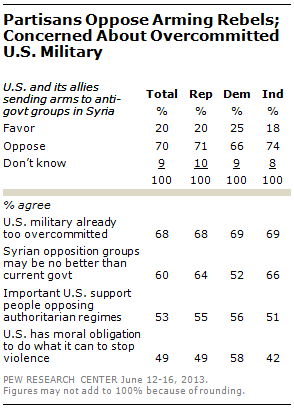Warning: the images shown in the video are graphic and may not be appropriate for some viewers or viewing at the work place.
There is little explanation for the cause of all the deaths in the rebel held suburbs of Damascus, other than the use of chemical weapons. The major question is who used it. The natural answer would be the Assad government. But one needs to remember that many military facilities are now in the hands of the rebels and no one is precisely certain who they are. While the western mind would like to reject this kind of mass murder in the name of a cause, it has happened. Extremist are not only willing to sacrifice their lives but others as well in the name of their cause.
Obama Officials Weigh Response to Syria Assaul
by Mark Landler, Mark Mazzetti and Alissa J. Rubin, The New York Times
The day after a deadly assault in Syria that bore many of the hallmarks of a chemical weapons attack, a sharply divided Obama administration on Thursday began weighing potential military responses to President Bashar al-Assad’s forces.
Senior officials from the Pentagon, the State Department and the intelligence agencies met for three and a half hours at the White House on Thursday to deliberate over options, which officials say could range from a cruise missile strike to a more sustained air campaign against Syria.
The meeting broke up without any decision, according to senior officials, amid signs of a deepening division between those who advocate sending Mr. Assad a harsh message and those who argue that military action now would be reckless and ill timed.
In an interview with CNN broadcast on Friday, Mr. Obama said the United States is “gathering information” about the chemical weapon reports, but he suggested that it is already clear that the incident will demand “America’s attention.”
“America’s attention,” there are several interpretations of that statement but it sounds like some kind of military intervention and Assad is fast losing friends.
Syria: Russia joins international pressure on Assad over chemical attack
by Julian Borger and Dan Roberts, The Guardian
Intervention from regime’s staunch ally comes as UK directly blames Damascus for attack and Obama hints that US cannot afford to stand by
Russia has added to the mounting pressure on the Syrian government over Wednesday’s apparent gas attack by calling for UN inspectors to be granted immediate access to the site in eastern Damascus.
The Russian foreign ministry declared that Moscow and Washington had a “mutual interest” in pushing for an immediate investigation by UN investigators who are already in Damascus.
A ministry statement, issued after a conversation between the Russian foreign minister, Sergey Lavrov and his US counterpart, John Kerry, said the “Russian side called on the Syrian government to co-operate with the UN chemical experts”.
Democracy Now!‘s Amy Goodman was joined by Razan Zaitouneh, lawyer and human rights activist, who works with the Human Rights Violation Documentation Center and Patrick Cockburn, Middle East correspondent for The Independent in London to discuss the attack.
The Syrian government is facing growing pressure to allow an international probe of an alleged chemical weapons attack on the outskirts of Damascus. The Syrian opposition says government forces fired poisonous gas into rebel-held neighborhoods of Ghouta, killing hundreds of people. Video posted on YouTube this week shows frantic scenes of overwhelmed hospitals, dead children and countless bodies. If confirmed, it would stand to be the most violent incident in Syria since the rebel uprising began two years ago and one of the worst toxic attacks in decades. The alleged attack occurred just days after U.N. inspectors arrived in the country to investigate previous attacks.
Transcript can be read here




Recent Comments